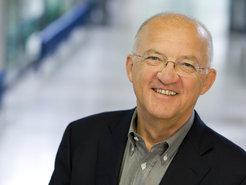MPIB-Emeritus Axel Ullrich is awarded with Lasker Award 2019
Axel Ullrich, together with H. Michael Shepard and Dennis J. Slamon, receives the highest biomedical scientific award in the United States for the invention of Herceptin.
Herceptin was the first monoclonal antibody that blocks a cancer causing protein. For the invention of Herceptin and the development of a life-saving therapy for women with breast cancer, three researchers are now receiving the Lasker~DeBakey Clinical Medical Research Award: Axel Ullrich, Emeritus Director at the Max Planck Institute of Biochemistry and former Genentech scientist, H. Michael Shepard, former Genentech scientist and Dennis J. Slamon from the University of California, Los Angeles. The prize is the highest biomedical scientific award in the USA and is awarded with 250,000 US dollars. The award ceremony will take place in New York City on Friday, September 20.

In the mid-1970s, scientists discovered that certain genes, when mutated, can cause cancer; researchers theorized that targeting these oncogenes, or the proteins they code for, could prevent the spread of malignancies. The combined efforts of H. Michael Shepard, Dennis J. Slamon, and Axel Ullrich culminated in the creation of Herceptin, the first monoclonal antibody therapy that targets a protein encoded by an oncogene.
Monoclonal antibodies are proteins that bind to specific invader organisms or abnormal (e.g. cancerous) cells. Herceptin is a humanized monoclonal antibody. Such antibodies are created in mice and then adapted to be tolerated by the human immune system.
Herceptin is used to treat HER2-positive breast cancer, an aggressive type of breast cancer characterized by multiple copies of the gene coding for the protein HER2 (human epidermal growth factor receptor 2). Over 50,000 women in the United States are diagnosed with this type of breast cancer every year.
Shepard and Ullrich, then working at Genentech, and Slamon, at the University of California Los Angeles, conducted complementary research that led to powerful clinical results. Herceptin, when coupled with chemotherapy, stalled HER2-positive breast cancer progression and extended survival compared to chemotherapy treatment alone.
Approved by the FDA in 1998, Herceptin was among the earliest targeted therapies designed to block the growth of cancerous cells. Over 2.3 million individuals have been treated with Herceptin to date.
These researchers provided the first demonstration that monoclonal antibodies were a viable and effective strategy to treat solid tumors, opening a new path to develop and deploy antibodies to treat cancer.
About Axel Ullrich
Axel Ullrich studied biochemistry in Tübingen and went to the University of California, San Francisco, USA in 1975 as a postdoctoral researcher. In 1979, he decided to focus on application-oriented research and moved to the world's first biotechnology company, Genentech in San Francisco, USA. There he established the research programme on the molecular biology of growth factors and their receptors, the key components for cell communication. From 1988 to October 2016, Ullrich was Director and Head of the Research Department “Molecular Biology” at the MPI of Biochemistry. Since November 2016, he has been an emeritus scientific member of the institute.
